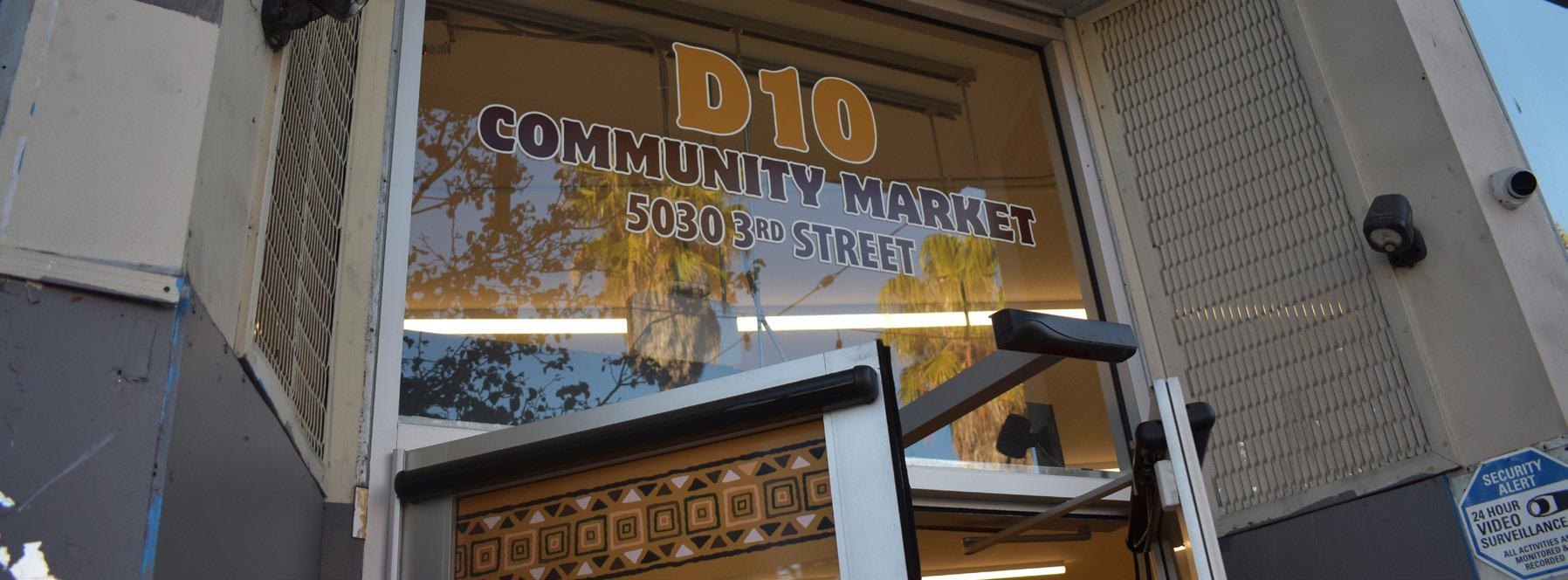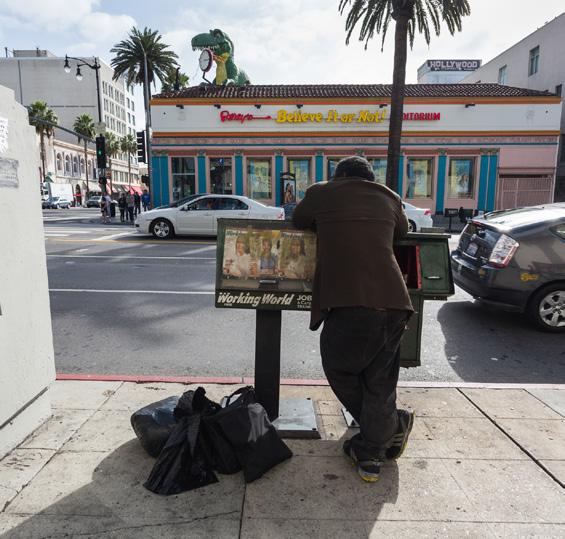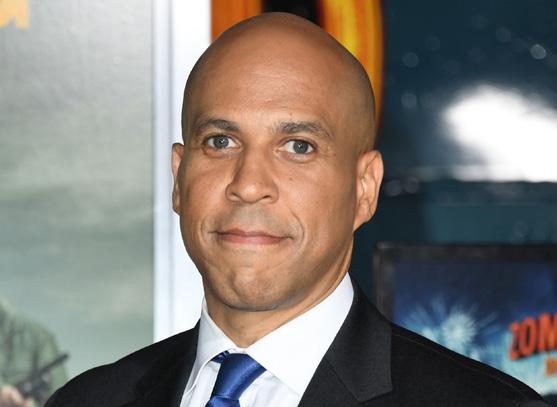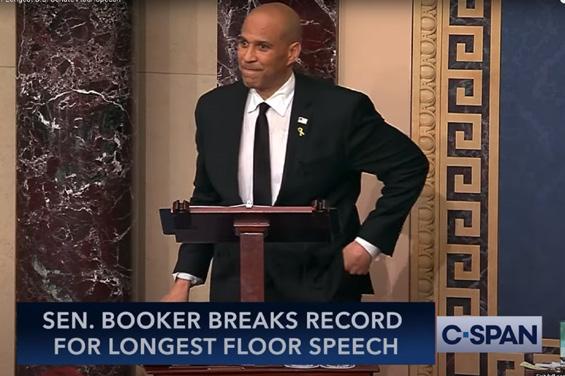Vote Barbara Lee for Mayor












By Richard Johnson
On Saturday, March 29, the Oakland Public Safety & Peace Movement Car Caravan successfully brought together community leaders, activists, and organizations in a powerful rally advocating for peace, safety, and economic opportunity in Oakland. The event, which included a car caravan and march, highlighted urgent issues such as violence, unemployment, home-

By Magaly Muñoz
Part 2
Why Not Oakland?
Only slightly larger than San Francisco, Oakland has over 400 food distribution sites. Oakland provides grants to nonprofit-run organizations that run grocery programs. But in recent months, the city has begun to reduce those, forcing some organizations to regroup, and making it challenging to imple-
By Ken Epstein
Candidate Loren Taylor is facing a series of criticisms that he and Independent Expenditure groups backing him have engaged in false and misleading campaigning as they seek to overcome veteran, progressive former Congresswoman Barbara Lee’s presumptive lead in the April 15 special election for Mayor of Oakland.
Most recently, the Alameda County Democratic Party told Taylor this week to stop using its logo in campaign materials
Last Sunday, Igor Tregub,
chairman of the party’s executive committee and a member of the Berkeley City Council, sent out an email saying Taylor’s use of the logo was unauthorized, according to CBS News
“We have demanded of the Loren Taylor for Mayor campaign to cease and desist immediately from any further unauthorized and improper use of the Alameda County Central Committee Logo or materials,” he said. “Barbara Lee is the Alameda Democratic Party’s sole endorsed candidate for Oakland mayor in the April 15 special election.”
ment a community market similar to San Francisco’s.
The Oakland Post repeatedly reached out to city and county officials for comment on the story but


Simon Announces Over $2.7 Million in Funding for Scientific Research in the East Bay
Congresswoman Lateefah Simon (D-CA-12) announced over $2.7 million in funding for scientific research projects at the University of California, Berkeley. Five separate research projects at UC Berkeley will receive a National Science Foundation (NSF) award to continue their cutting-edge research to provide new chemistry, mathematics, behavioral and cognitive sciences, and engineering solutions.
“When my late husband was diagnosed with a rare form of cancer,

Renia
Suzanne Robinson Wants to Be Mayor of Oakland

By Magaly Muñoz
Ahead of the April 15 special mayoral election, the Oakland Post interviewed Suzanne Robinson on her plans for public safety, budget reform, and creating an inclusive, thriving Oakland.
Candidates in the race include Barbara Lee, Loren Taylor, Renia Webb, Cristina Grappo, Elizabeth Swaney, Eric Simpson, Peter Liu, and Mindy Pechenuk. Tyron
Jordan dropped out and endorsed Lee. Taylor and Swaney didn’t submit responses, and Webb declined to comment.
Below are excerpts from Robinson’s responses, edited for length and clarity.
What is your plan to address public safety concerns with residents?
Robinson identified both
chronic understaffing and a collapse in morale within the Oakland Police Department. “We have never had enough police officers,” she said. “We have issues that have collapsed our police department during the pandemic, including a major cultural collapse… [that] has caused the officers to do ‘as little as possible.’”
She attributed that fearbased culture to the firing of senior officers and the lack of support for frontline staff, stating, “Organizations cannot attract and retain top talent without [a healthy culture], and we have retention issues in the department.”
She argued that violence prevention efforts need to be more targeted. “The CF [Ceasefire] program has gaps as they only work with groups and gangs and their target age demographic is age 34,” she said. She emphasized bringing back in-person activities—such as the “Town Nights” program—to engage youth and reduce crime in hotspot areas. To empower residents, Robinson supports rebuilding community policing. “The citywide community policing infrastructure is one of the most underutilized assets our city has,”

Disputing the criticism, Taylor’s campaign said the logo was used to reinforce a statement on the mailer, illustrating that he is a
member of the party’s governing board.
“This really shows the absurdity of insider politics,” said Trisha-
la Vinnakota, a consultant with Taylor’s campaign. “Oakland voters are smart enough to know that this is another petty, dirty attack on Loren’s campaign designed to …protect the status quo.”
Lee’s campaign responded.
“Not showing up for debates — that is anti-democratic,” Taylor said.
However, KQED issued a statement saying that a debate between the two candidates was never scheduled.
“We had never confirmed, nor publicized a formal debate. But we did invite both candidates to make their cases with listeners on Forum, together or separately. As
“This is yet another example of a pattern of misinformation and plain lies from Loren Taylor and his supporters,” said Bilen Mesfin. “Oakland doesn’t have time for fake ads, fake headlines, and fake endorsements. We need a leader who is ready to govern on day one - and that’s Barbara Lee.” Taylor also recently accused Lee of refusing to directly debate him on KQED. He released a statement “calling out Lee for dodging a … one-on-one debate,” according to KRON TV.

By Bo Tefu
California Black Media
In 2024, California’s homelessnesscrisishitrecordlevels,withover 187,000 individuals experiencing homelessness, accounting for 24% of the nation's total homeless population of 771,500. Nearly two-thirds of these individuals were unsheltered, representing nearly half of the unsheltered population in the United States. This stark reality continues to make homelessness one of the top issues for Californians.
However, while the state’s homelessness crisis remains dire, the growth rate in California from 2023 to 2024 was slower than the national average. The U.S. homeless population grew by 18%, driven largely by a 25% increase in sheltered homelessness, compared to just a 3% rise in California. Unsheltered homelessness in the U.S. grew by 7%, whereas California saw only a 0.4% increase, reversing the trend of larger increases in California that had been observed in the past decade.
Each January, the U.S. Depart-ment of Housing and Urban Development (HUD) requires local agencies to conduct a "point-in-time" (PIT) count of homelessness. These annual
counts, though limited by concerns about undercounting, offer a crucial snapshot of homelessness trends at the federal, state, and local levels.
In California, over 70% of the state’s homeless population resides in the 10 Continuums of Care (CoCs). These CoCs report varying trends: Los Angeles, Alameda, and San Francisco saw a decline in unsheltered homelessness but an increase in sheltered homelessness, with rises of 14%, 18%, and 25%, respectively. In contrast, San Diego experienced an 18% increase in unsheltered homelessness, while Sacramento and San Joaquin reported significant fluctuations in homelessness figures, potentially due to local counting changes.
Advocates for unsheltered Californians say the rise in homelessness highlights the urgent need for both immediate financial and behavioral health support, as well as long-term housing solutions. Rising home prices, high rents, and low homeownership rates have intensified California’s housing crisis. Over a quarter of Californians, including nearly 40% of low-income adults, worry daily about their housing costs.
California lawmakers have invested billions into homelessness programs, but an audit revealed a lack of data to measure their effectiveness. In his 2025-26 annual budget, Gov. Gavin Newsom proposed creating the California Housing and Homelessness Agency to improve coordination and accountability in the state’s response to the ongoing crisis. Additionally, increased funding from Prop 1 will support housing and treatment for individuals with behavioral health needs.






By Bo Tefu California Black Media
By Charlene Muhammad California Black Media
Contributor
TJ Simpson is a third-year Parks and Recreation Management major at California State University, Chico (CSU Chico).
A first-generation college student from Southern California, his love for the outdoors stems from his great-grandmother, whose deep appreciation for nature shaped his own. Now based in Long Beach, TJ is working toward his dream of becoming a park ranger—a goal made more attainable through his participation in #CaliforniansForAll College Corps.
The #CaliforniansForAll College Corps program was created to help college students gain realworld experience, make a meaningful impact in their communities, and reduce student debt. It connects undergraduates with service opportunities that address critical issues across California.
College Corps fellows contribute in key areas such as education, climate action, and food insecurity. They assist K-12 students through tutoring and men-
torship, support sustainability and conservation projects, and work with local organizations to combat hunger and improve access to nutritious food.
TJ first learned about College Corps during his freshman year at CSU Chico. Encouraged by his aunt to join as a way to make friends in a new city, he initially enrolled but later withdrew, feeling he wasn’t ready to “put himself out there.”
However, in 2024, his perspective changed. A series of school field trips to San Francisco exposed him to how College Corps could bridge his academics with hands-on experience in parks and recreation management.
“I realized that rejoining College Corps would supplement my studies and give me real-world experience in my field,” said TJ. “It wasn’t just about making friends anymore—it was about building a foundation for my career.”
TJ credits his great-grandmother’s influence for fostering his deep connection to nature. Growing up in San Fernando Val-
The U.S. Department of Education has launched an investigation into California’s ban on ‘forced outing’ of students’ gender identity to parents, escalating tensions between the state and the Trump administration over LGBTQ+ rights and parental access to student records.
The probe, announced March 27, targets a 2024 California law signed by Gov. Gavin Newsom, which prohibits schools from automatically informing parents if a student changes their name, pronouns, or gender identity. Federal officials argue the law may violate the Family Educational Rights and Privacy Act (FERPA), which guarantees parental access to student records.
“Teachers and school counselors should not be in the business of advising minors on consequential decisions about their gender identity and mental health,” said U.S. Education Secretary Linda McMahon. “That responsibility lies with parents.”





If the law is found to be in violation of federal regulations, California risks losing billions in federal education funding, including grants supporting low-income and special-needs students. State officials defended the law as a vital protection for LGBTQ+ youth. State Superintendent Tony Thurmond emphasized that students must feel safe in order to learn, adding that “forced outing” policies put vulnerable youth at risk. The governor’s office dismissed the federal probe, arguing that FERPA does not mandate schools to disclose gender identity changes unless parents request their student’s records.
The investigation is part of a broader push by the Trump administration to limit LGBTQ+ protections in education, including executive orders restricting gender-affirming care and limiting transgender participation in school sports.
Legal experts say the case could set a precedent for how federal law applies to student privacy and parental rights in education.



Congresswoman Barbara Lee is committed to community and constitutional policing with resources and policies to build safe neighborhoods. Barbara supported funding for the local “Cops” program with a successful reentry program and a commitment to public safety for children and families. Barbara as Mayor will know how to also bring State support to Oakland, having served as our State Senator and State Assemblywoman as part of her accomplished career of



Adult Day Program
Dedicated staff needed to work with individuals with developmental disabilities in communitybased settings, or environments. Qualifications: High school or equivalent. Driver’s license. Dependable and efficient. Background check. Physical exam and TB test. Training available. Decent wages. Please call (510) 690-9570.


Oct. 1, it was noted that eight of the 22 MacArthur fellows were African American. Among the recipients of the so-called ‘genius grants’ are scholars, visual and media artists a poet/writer, historian, and dancer/choreographer who each receive $800,000 over
a five-year period to spend as they
Their names are Ruha Benja min, Jericho Brown, Tony Cokes, Jennifer L. Morgan, Ebony G. Patterson, Shamel Pitts, Jason Reynolds, and Dorothy Roberts. This is the eighth and last in the series highlighting the Black awardees. The report below on Dorothy Rob-
By Terri Schlichenmeyer
The Trouble of Color: An American Family Memoir
Author: Martha S. Jones, c.2025, Basic Books, $30, 315 pages
Last Seen: The Enduring Search by Formerly Enslaved People to Find Their Lost Families
Author: Judith Giesberg, c.2025, Simon & Schuster, $29.99, 309 pages
Who do you think you are?
That’s a question that can be taken a multiple of ways. It’s inyour-face, aggressive, angry. Or it’s inquisitive and open, asking for introspection. Where did your family come from, and who do you think you are? Or, as in these books, is that question to be answered?
For author Martha S. Jones, issues of identity were already understood: she’d grown up knowing that there were Black ances-
tors in her lineage, full-stop. She never thought it was anything but obvious — until a college classmate questioned Jones’ heritage. In her book, “The Trouble of Color” (Basic Books, $30), Jones writes of untangling her truth. Color obviously mattered differently to Jones’ three-timesgreat grandmother than it did for her parents. Color didn’t draw a smooth line through history, it didn’t stay in one place or even in one century. The story of living as someone of color weaved all along Jones’ family tree, often revealing nuggets of pride, strength, and of surprise.
There’s a journey inside this book that begs readers to go along — and you’ll be glad you did. It takes you from city to country to find Jones’ ancestors, and it’s both comfortingly familiar and quite astounding. If you’ve ever delved into your own heritage, had your DNA tested, or looked into your ancestry and discovered unex-
pected things, this is a book to read.
erts is excerpted from the MacArthur Fellows web site.
A graduate of Yale University with a law degree from Harvard, Dorothy Roberts is a legal scholar and public policy researcher exposing racial inequities embedded within health and social service systems.
If you’ve done those things, then you know the delight you feel when you found someone who was lost — and you’ll understand the heavy sadness and urgency inside the stories in “Last Seen: The Enduring Search by Formerly Enslaved People to Find Their Lost Families” by Judith Giesberg (Simon & Schuster, $29.99).
Body: Race, Reproduction, and the Meaning of Liberty 1997)”, she
nied agency to Black women and
Sine 2012, she has been a professor of Law and Sociology, and on the faculty in the department of Africana Studies at the University of Pennsylvania.
Roberts’s work encompasses reproductive health, bioethics, and child welfare. She sheds light on systemic inequities, amplifies the voices of those directly affected, and boldly calls for wholesale transformation of existing systems.
Roberts’s early work focused on Black women’s reproductive rights and their fight for reproductive justice. In “Killing the Black
One of the most heinous practices of slave owners in America was the separating of families. Children could, and were, sold away from their parents. Siblings were divided. Husbands and wives were sold apart, with no idea if or when they might see one another again. After Emancipation, it was common to see advertisements in newspapers, classified ads, editorials, and posters in search of missing loved ones and separated relatives.
In this heart-wrenching, sometimes happy, always powerful book, Geisberg profiles a tiny handful of those stories. Once he found them, for instance, Tally Miller changed his surname so that no one could ever take his family away from him again. Hagar Outlaw struggled to find as many of her nine children as she could, once she was freed. Time never stopped husbands from looking for their wives (or the other way around), or siblings from finding each other.
This book explodes the imagination, and it’ll make you glad for the research methods we have at our disposal today. Readers who’ve hit a dead-end on their own genealogical searches will want to read this important slice of devastating American history.
Of course, these books will make you want more, and you’ll get it by heading for your favorite bookstore or library. There, you’ll find what you need, and who, maybe, you think you are.

standing of reproductive freedom. This work prompted Roberts to examine the treatment of children of color in the U.S. child welfare system.
Special to The Post Pierre Sandor Diabankouezi, a master choreographer, dancer, musician, singer, and visual artist, known in the Bay Area for collaborating with the late Malonga Casquelourd’s troupe Fua Dia Congo, passed away in his hometown of Brazzaville, Congo, on Feb. 26. He was 85.
A dedicated teacher and community builder, Diabankouezi shared his artistic gifts generously,
After nearly two decades of research and advocacy work alongside parents, social workers, family defense lawyers, and organizations, Roberts has concluded that the current child welfare system is in fact a system of family policing with alarmingly unequal practices and outcomes. Her 2001 book, “Shattered Bonds: The Color of Child Welfare,” details the outsized role that race and class play in determining who is subject to
offering classes and workshops in dance, music, singing, and painting to students of all ages and levels.
state intervention and the results of those interventions.
“The shortest distance between two cultures is through art,” was one of his beliefs.
Through interviews with Chicago mothers who had interacted with Child Protective Services (CPS), Roberts shows that institutions regularly punish the effects of poverty as neglect.
CPS disproportionately investigates Black and Indigenous families, especially if they are lowincome, and children from these families are much more likely than white children to be removed from their families after CPS referral.
Based in Berkeley, California, he worked full-time as a professor of arts, choreographer, and director for his California-based troupe, Les Bantous Sissa Kongo, as well as Fua Dia Congo. His teaching style was known for its patience and ability to connect with students, fostering a deep appreciation for Congolese culture.
In “Torn Apart: How the Child Welfare System Destroys Black Families—and How Abolition Can Build a Safer World (2022),” Roberts traces the historical, cultural, and political forces driving the racial and class imbalance in child welfare interventions.
Born to Nganga Samba and Ndundu Marie Diamayolongo in 1939, Sandor’s artistic journey began in 1948, at the age of 9, when he commenced formal studies in traditional Congolese dance with Master of Ballet Albert Mfina at the School of Art, Poto Poto Brazzaville.
He began touring the Congo as a dancer in 1949 with the Wassakimba Dance Troupe. At 21, he founded his own troupe, Sissa-Kon-
These include stereotypes about Black parents as negligent, devaluation of Black family bonds, and stigmatization of parenting practices that fall outside a narrow set of norms.
go (“Souvenir of the Ancestors”), leading 20 musicians and dancers on extensive tours across Central, Western, and Northern Africa for a decade. He disbanded Sissa-Kongo, developed a two-person nightclub act that took him to Morocco and Spain before he settled in Toulouse, France.
She also shows that blaming marginalized individuals for structural problems, while ignoring the historical roots of economic and social inequality, fails families and communities.
Roberts argues that the engrained oppressive features of the current system render it beyond repair. She calls for creating an entirely new approach focused on supporting families rather than punishing them.
After earning a master’s degree in arts and drama from CFRAD, Diabankouezi taught there for a few years becoming ballet master and choreographer for the National Ballet du Congo in 1976, elevating the company’s artistry and international recognition.
Her support for dismantling the current system of child welfare is unsettling to some, but her provocation inspires many to think more critically about its poor track record and harmful design.
Invited by Tanawa Dance led by Titos Sompa, he was invited to the United States in 1985 to share his profound knowledge of Congolese dance and culture, becoming a significant figure in the American dance community.
A year later, Malonga Casquelourd invited him to join Fua Dia Congo as a lead choreographer, cos-
By uncovering the complex forces underlying social systems and institutions, and uplifting the experiences of people caught up in them, Roberts creates opportunities to imagine and build more equitable and responsive ways to ensure child and family safety.




TJ Simpson — College Corps ... Continued from page 2
ley, she was a former Pathfinder Scout who instilled in him and his brother a love for the outdoors.
While he once considered botany or forestry, TJ found that CSU Chico’s Parks, Recreation, and Hospitality Management program was the perfect fit. “Three years in, and I haven’t doubted this major at all!” he said.
One of the most rewarding aspects of College Corps for TJ has been the opportunity to network with professionals in state parks,
Bureau of Land Management sites, and conservation initiatives. Through these connections, he has explored potential career paths while developing crucial leadership skills.
The program has also helped him strengthen essential skills like adaptability and problemsolving. As someone who is neurodivergent, TJ appreciates predictability and structure, but his service work has required him to embrace flexibility.
“For example, transportation has been a challenge since I rely on public transit and carpools to
reach host sites,” he said. “But I’ve learned to be patient and develop creative solutions to overcome obstacles.”
His dedication and work ethic have earned the trust of College Corps directors, leading to leadership opportunities—including serving as a program ambassador.
“My directors have recognized my passion and ability to connect with others,” TJ said. “They’ve given me opportunities to help prepare for trips, coordinate with other Fellows, and take on responsibilities that have helped me grow as a leader.”
TJ has grown from a onceshy student into a confident leader within College Corps. But beyond his personal growth, he recognizes the importance of representation in the outdoor and environmental fields.
As a Black student in a predominantly White field, TJ rarely saw people who looked like him in nature-based organizations like the Boy Scouts or outdoor youth programs. This lack of representation often made him feel like he didn’t belong.
“Being a Black Corps fellow gives me the strength to share my
passion with those around me, one job at a time,” TJ said. He hopes to be a role model for other Black students and individuals interested in climate-related careers.
College Corps, in partnership with more than 40 colleges and universities, provides undergraduate students with access to training, networking, and professional development opportunities. Participants benefit from hands-on experience in high-impact service fields, financial assistance— earning up to $10,000 for completing 450 hours of service—
and professional growth through developing skills in communication, teamwork, and leadership. Through College Corps, TJ has found purpose, leadership, and a path to a fulfilling career. With his dedication, resilience, and passion for conservation, he is well on his way to making a lasting impact in parks management and environmental advocacy.
For more information about #CaliforniansforAll College Corps visit www.cacollegecorps. com







By Brandon Patterson
President Trump targeted the National Museum of African American History and Culture in Washington, D.C., also affectionately known as the “Black Smithsonian,” in an executive order aimed at rooting out what he called “corrosive” content from educational and cultural institutions.
In the executive order dated March 27 and titled “Restoring Truth and Sanity to American History,” Trump accused the Smithsonian Museum system of “rewriting our nation’s history” with “a distorted narrative driven by ideology rather than truth.”
“Under this historical revision,” the order continued, the nation’s righteous legacy has been “reconstructed as inherently racist, sexist, [and] oppressive.”
The executive order empowers Vice President JD Vance to review all exhibits throughout
the Smithsonian network and to work with Congress to ensure that future funding for the museums don’t support exhibits that “degrade shared American values [or] divide Americans based on race.” It also calls for a review of any monuments removed from Smithsonian museums since 2020, when Confederate monuments were removed from public display around the country in the wake of the police murder of Goerge Floyd.
Trump has also targeted funding and programming at museums, libraries, other cultural institutions like the Kennedy Center for the Performing Arts, and at college campuses since taking office in January. This executive order cited the National Museum of African American History and Culture by name, singling out an exhibit called “The Shape of Power” that explores how sculpture and art have been used to per-
Why Black Americans Should Care About and Advocate for Haiti—Especially Now

By Sabrina Saunders Special to The Post
When I began writing this article a few weeks ago, it was Black History Month—a time that calls us to remember our shared struggles and triumphs. I felt the urgency to write this piece because of the historic and contemporary connection Black Americans have with Haiti and, more importantly, the current humanitarian crisis engulfing the nation.
My heart is heavy as I reflect on the suffering of the Haitian people: from gangs tightening their grip on communities, to the looming termination of the Temporary Protected Status (TPS) program this August, which may lead to the deportation of over 500,000 Haitians from the United States.
One story that especially haunts me is that of a mother de-
ported from the Dominican Republic, who, under the threat of gang violence, was forced to throw her infant into a fire. Overcome by grief and trauma, she died shortly afterward. Her tragic story is not only heartbreaking— it calls for a deeper examination of immigration policy and how it affects Haitians on both sides of the border.
Our Shared History and Haiti’s Beacon of Hope African Americans’ connection to Haiti is not only emotional but historical. Our ancestors share the legacy of being brought to the Americas in chains, their lives uprooted by the horrors of the Trans-Atlantic slave trade. Haiti—the first Black republic—won its freedom from French colonial slave masters during the Haitian Revolution (1791–1804). That revolution ignited hope among enslaved and free Black people across the Americas, including the United States. Haiti stood as a symbol of Black freedom, resistance, and self-determination—what scholars call Black Internationalism.
Today, Haiti is in one of the worst crises in its modern history. While some may dismiss the turmoil as just another chapter in Haiti’s ongoing challenges, experts agree: this moment is different. It is more dangerous, more desperate, and more urgent.
More than 1 million people in Haiti are internally displaced — forced from their homes by gang violence that now resembles terrorism. Food insecurity affects over 50% of the population. Sexual violence is soaring—
petuate racism throughout American history. Other exhibits at the museum include displays on Emmett Till, the Civil Rights Movement, and the Obamas.
The 21-museum Smithsonian network is the world’s largest museum, education and research complex. About 60% of the Smithsonian’s funding comes from the federal government, according to the Guardian US. The system is nearly 180 years old but only opened a museum dedicated to African American history nine years ago in 2016, during the final year of former President Obama’s presidency.
Historians and Black political leaders have slammed the order targeting the system, especially the Black Smithsonian, as an attempt to sanitize the roles of race and racism in U.S. history.
“It is a five-alarm fire for public history, science and education in America,” Samuel Redman, a

history professor at the University of Massachusetts Amherst, told the Associated Press. “While the Smithsonian has faced crisis moments in the past, it has not been directly attacked in quite this way by the executive branch in its long history. It’s troubling and quite scary.”
Trump’s order is “a literal attack on Black America itself,” Ibram X. Kendi, the race historian and Howard University professor, also told the outlet. “The Black Smithsonian, as it is affectionately called, is indeed one of the heartbeats of Black America.”
Congressional Black Caucus Chair Rep. Yvette Clarke (D-NY9) also slammed the order. “We do not run from or erase our history simply because we don’t like it,” she said in a written statement. “We embrace the history of our country – the good, the bad, and the ugly.”
Sen. Cory Booker’s RecordBreaking Good Trouble

By Emil Guillermo
If you need inspiration and motivation to protest these dire times — when tariffs could destroy your economic well-being, when legal immigrants are deported, when thousands of federal workers are losing jobs on a whim, and when Africa has lost aid to prevent famine and disease — remember this week’s “Cory Show.”
Though it really serves as the model for “The Peoples’ Show.”
Its simple strength will give you strength.
Booker is a Democrat from New Jersey, but starting last Monday at 4pm Pacific Daylight Time, Booker was speaking for all of us.
From the floor of the Senate, Booker led the way.
He spoke out, like we all should. And then he just kept going.

As Booker put it, it was “a moral moment,” a public official giving the longest speech in Senate history (more than 24 hours and 19 minutes) to denounce the un-Constitutional agenda of the Trump administration.
In the 19th hour Booker said: “I’m not going to sit by and do nothing. That’s why I’m standing here.”
He talked about everything

Trump has done to date, especially the threats to everything from veterans to USAID to Social Security and affordable housing.
Booker was lucid enough in the 17th hour to restate his aim.
“This is not (a matter of) right or left. It is right or wrong,” Booker said deep into his demonstration. “This is not a partisan moment. It is a moral moment. Where do you stand? We started this by talking about John Lewis. It is time for good trouble.”
Indeed, the spirit of the late Georgia member of Congress and civil rights leader was the spark that began the marathon.
“In just 71 days, the President of the United States has inflict-
By Edward Henderson California Black Media
On March 26, California Secretary of State Dr. Shirley N. Weber released a statement condemning an executive order President Trump released the day before making sweeping changes to federal election processes around registration, voting, and the counting of ballots.
Weber likened the President’s order to the discriminatory practices that were legal in the United States before the passage of the Voting Rights Act of 1965.
“President Trump’s executive order, ‘Preserving and Protecting the Integrity of American Elections,’ does nothing of the sort. Instead, it is a calculated and dramatic assault on every American’s right to vote,” Weber wrote.
The order mandates that states reject ballots not received by Election Day. In California, mail-in ballots must be postmarked on Election Day but can arrive up to seven days later. Thirteen million mail-in ballots were cast during the 2024 general election in California, nearly 81% of all votes cast.
The order also requires the Election Assistance Commission to add proof of citizenship to the national voter registration form. States are required to accept that national form under federal law but can still create their own voter registration forms. If states don’t comply with the new order, they would lose federal funding for elections.
About 1 in 10 adult U.S. citizens, according to one recent survey — don’t have ready access to documents that prove their citizenship, such as a birth certificate or passport, and would face hurdles when voting.
Trump has been vocal about his concerns surrounding how ballots are counted since 2020, attributing his loss to former President Joe Biden to “unfair voting practices” like mail-in voting.
“Election fraud. You’ve heard the term. We’ll end it, hopefully. At

By Bo Tefu California Black Media
Last week, U.S. Sen. Alex Padilla (D-Calif.) visited the U.S. Naval Station in Guantánamo Bay, Cuba (GTMO) with a group of other senators to conduct oversight of what he called “the ongoing Department of Defense activities to support the Department of Homeland Security in the unlawful relocation of migrants.” Padilla, who is the ranking
least, this will go a long way toward ending it,” Trump said during the signing at the White House, adding, “We have to straighten out our elections.”
Among voting rights advocates, concerns have risen over the potential hurdles that requiring proof of citizenship could pose for low-income Americans. Another section of the order empowers the Department of Government Efficiency (DOGE), along with the Department of Homeland Security, to potentially subpoena states to review voter rolls for compliance with federal laws.
“Under the guise of protecting Americans from voter fraud, this unprecedented and reckless interference into state election processes is premised on a widely debunked myth of massive non-citizen voting,” Weber continued.
“Make no mistake, President Trump, through this action, shows that he fears voters and America’s longstanding principles of democracy. As California Secretary of State, I will do all in my power to ensure that all eligible Californians can freely and securely participate in our democracy.”
Some also view Trump’s order as a revival of the Safeguard American Voter Eligibility (SAVE) Act, a bill that would’ve required anyone registering to vote in federal elections to provide proof of citizenship. The act was passed by the House of Representatives in July but was halted by the then-Democratic majority in the U.S. Senate and President Biden.
Available data shows that noncitizen voting is extremely rare.
After the 2016 election, the Brennan Center for Justice, which advocates for voting rights, surveyed local election officials in 42 jurisdictions with high immigrant populations and found just 30 cases of suspected noncitizens voting out of 23.5 million votes cast.
Member of the Senate Judiciary Immigration Subcommittee, has been a vocal critic of the Trump administration moving illegal immigrants from the United States to Guantánamo Bay.
“After examining the migrant relocation activities at Guantánamo Bay, we are outraged by the scale and wastefulness of the Trump Administration’s misuse of our military. It is obvious that Guantánamo Bay is a likely illegal and certainly illogical location to detain immigrants. Its use is seemingly designed to undermine due process and evade legal scrutiny,” said Padilla in a statement. “The staggering financial cost to fly these immigrants out of the United States and detain them at Guantánamo Bay — a mission worth tens of millions of dollars a month — is an insult to Amer-


By Rev. Dr. Benjamin F. Chavis, Jr.

plify our mutual interests to protect and maintain the hard-fought gains and progress that has been accomplished by African Americans in the last two centuries.
dollars from our consumership.
This is an opportunity for anyone that is 62 years or older, to live in a studio apartment in a great location within the City of Alameda. Linnet Corner is within close walking distance to public transit, grocery stores and other shopping outlets, parks, local employers, and schools. Linnet Corner will open in September 2025.
For over 198 years the Black Press and the Black Church have joined together for causes of freedom, justice, equality, equity, and empowerment. Today more than ever before there is renewed urgency for the Black Church and the Black Press to publicly am-
Sen. Padilla: ...
Continued from page 8
ican taxpayers. President Trump could implement his immigration policies for a fraction of the cost by using existing ICE facilities in the U.S., but he is obsessed with the image of using Guantánamo, no matter the cost,” Padilla continued.
According to the New York Times, there are about 1,000 U.S. government employees, most-
Care About and Advocate for Haiti ...
Continued from page 8
United Nations’ reports estimate a 1,000% increase, impacting women, girls, and boys alike. In February, a brutal attack on Kenscoff—a peaceful working-class community about six miles from Haiti’s capital, Port-au-Prince, known for farming and skilled labor—left over 100 dead, though the actual number may be higher. These are teachers, medical workers, and pastors—pillars of Haitian society.
Let’s not forget the devastating 2010 earthquake that killed over 220,000 people, the 2021 assassination of President Jovenel Moïse, or that Haiti is now governed by an unelected transitional council. The compounding crises have left the nation teetering on the edge.
And now, the U.S. plans to end TPS for Haitians—jeopardizing the lives of half a million immigrants who have built families, businesses, and lives here in the United States. Their return to a
Booker’s RecordBreaking Good Trouble ...
Continued from page 8
ed so much harm on Americans’ safety, financial stability, the core foundations of our democracy and even our aspirations as a people,” said Booker from the very beginning when he invoked Lewis from the start.
On the record, “We are not going back in America and nowhere else in the world in 2025.” We have already suffered too much from the vicious unprecedented genocide, terrorism, and crimes against humanity during the Transatlantic Slave Trade, global imperialism, racism, colonialism, neocolonialism, reconstruction and Jim Crow, mass incarceration, and present-day repressive policies and executives orders in an attempt to erase our history and legacy with libelous actions and falsehoods.
The prophetic voice of the Black Church continues to reso nate with historic and contempo rary inspiration and power. To gether we are resolutely demand ing respect from Target and those companies that make billions of
ly military personnel, working at Guantánamo Bay. There are also about 70 contractors from the De partment of Homeland Security stationed at the facility.
We are not begging. We are demanding respect and an equitable business relationship with Target and corporate America. From executive decision makers to marketing and promotions account managers, to human resources directors, and to the shareholders of the companies, we demand economic restoration and respect.
We salute the bold leadership of The Reverend Jamal Harrison Bryant and the New Birth Mis sionary Baptist Church in Atlan ta and other Black Church leaders across the nation who are stand ing up and preaching liberation theology.
Target will continue to be our target. We in the Black Press of America will continue our pub
This newly built housing will offer twenty-three (400-square foot) studio apartments, which will feature individual bathrooms and kitchens, and are suitable for one to two-person households.
The application period will start on April 4th, 2025 at 11am and will close on April 18th, 2025 at 11am.


Padilla blasted Trump for “undermining the readiness of the U.S. Military.”

“We met with dozens of servicemembers who were rushed to Guantánamo Bay without notice, leaving their critical day-today military missions behind in will always answer the call and get the job done, but their invaluable time and resources are being carelessly wasted by the President on this mission.”
collapsing nation would not just be inhumane—it would be catastrophic.
For those interested contacting me or seeking more information on how to support the efforts in Haiti, they may do so through my website oneaccordproject.org.
Personal Ties and On-theGround Experience
My connection to Haiti is not abstract. It is personal. Since my first mission trip in 2010, I have returned many times—most recently in October 2024, despite a Level 4 travel advisory from the U.S. State Department. Why? Because my heart, my work, and my people are there.
Through my organization, The One Accord Project, I am responsible for two schools and an orphanage that serve over 500 children. We also employ Haitian staff, whose livelihoods now hang in the balance. While 70% of Haiti’s schools are currently closed due to violence, I’m proud to report that our two schools remain open, and our orphanage continues to provide critical care. But the need is growing. Many parents—unable to feed or protect
Last week, the Center for Effective Lawmaking rated Padilla the second-most effective U.S. Senator in the 118th Congress.
their children—are making the heartbreaking decision to surrender them to orphanages. No parent should ever have to make that choice.
Why Black Americans Must Stand with Haiti
Our bond with Haiti is more than symbolic. We owe much of our own legacy of resistance and liberation to the Haitian Revolution. Haiti showed the world that Black people could—and would —rise up, throw off the shackles of slavery, and demand their dignity. That legacy should compel us to act now.
The crisis in Haiti is a moral and spiritual emergency. It is also a call to solidarity. Black Americans have a unique role to play— not only because of our shared history but because we know what it means to struggle for justice, to fight for survival, and to believe in hope even in the darkest hour.
We must raise our voices against the end of TPS. We must support humanitarian relief. We must demand immigration policies that honor the humanity of Haitians. We must give, organize, advocate, and pray.



2024–25 Season
“This is the time to get in some good trouble, to get into necessary trouble,” Booker said. “All of us have to think of those 10 words, 10 two letter words, ‘if it is to be, it is up to me,’ because I believe generations from now will look back at this moment and have a single question. ‘Where were you?’
“We have a president who has come in, and the one, the first thing he’s done in 71 days is insinuate fear and insecurity about Social Security by threatening it, by creating, telling lies about it, and by having somebody like Elon Musk calling it a Ponzi scheme,” Booker continued. You don’t insinuate fear amongst our elders who deserve our respect and deserve to retire with dignity.”
Critics will call it a rambling
stunt. But the country needed to see something extraordinary — at least one elected willing to take a public action that’s both real and symbolic. See the recording for yourself. Skip around to find your story. And then commit to making your own good trouble.
The “Cory Show” has not just set the record, but the example for all of America.
About the Author
Emil Guillermo is an awardwinning journalist and commentator. Find his “Emil Amok’s Takeout” on YouTube. Contact: emil@amok.com

The company’s legendary dancers return to Berkeley with programs that feature the Bay Area premieres of four works by Jamar Roberts, Matthew Rushing, Hope Boykin, and Lar Lubovitch; two new productions by Ronald K. Brown and Elisa Monte, plus beloved Ailey classics, including Revelations
Apr 8–13
ZELLERBACH HALL, BERKELEY
Congresswoman Simon Announces Over $2.7 Million in Funding ...
Continued from page 1
he joined a clinical trial –and he got two more years with our family because of that. I will always be a champion for scientific research and innovation, because I know it saves lives and drives our nation forward.
That’s why I’m proud to announce five National Science Foundation funding awards for research projects at Cal that are at the forefront of scientific advancement.
“At a time when the Trump Administration is attacking federal funds across the board, especially funding for higher education institutions and scientific research, I welcome these recent funding notices. I will continue to monitor the status of federal funds for institutions and organizations in CA-12, and I will keep the pressure on the Trump Administration to ensure life-saving federal funding continues.”
More details on the five research projects receiving NSF awards can be found below:
• Over $590,000 for a chemistry project at UC Berkeley that focuses on advanced computational models to predict the optical properties of chiral semiconductor nanocrystals and supports outreach activities with local K-12 students in STEM fields.
Over $380,000 for an engineer-
Continued from page 1 Loren Taylor Faces Allegations ...
ing research project at UC Berkeley that focuses on new spectrum, programmable center frequency, and programmable bandwidth.
• $700,000 for a chemistry project at UC Berkeley that focuses on the loss of coherence in single-photon emitters and supports the development of a quantum-educated U.S. workforce.
Over $400,000 for a mathematical sciences project at UC Berkeley that focuses on interdisciplinary research problems at the intersection of number theory (number systems and their interconnections) and representation theory (linearization of symmetries).
Over $670,000 for behavioral and cognitive sciences project at UC Berkeley that focuses on how the brain extracts meaning from sound and how the brain understands other sensory inputs.
Follow along with the work Congresswoman Lateefah Simon is doing in Washington, D.C. and in the East Bay on X, Instagram, BlueSky, and Facebook @RepLSimon.
Food Insecurity ...
did not receive a response.
At several food banks across West and East Oakland, residents shared their frustrations about long lines, wilting produce, and limited food choices.
At one food bank, located at Christian Tabernacle Church, a young mother, who requested anonymity for privacy reasons, waited in the rain for over three hours for a single bag of groceries.
“I like to get here early because I get better [quality] fruits and vegetables,” she said. She added that it’s not a lot of food that she receives for her family, but it helps close the gap when her budget is tight.
Behind her, several other women waited their turn. Neither the timing of the distribution nor the location of the food bank fits their schedules, the women said, but their choices feel limited.
Only a handful of Oakland food bank sites operate throughout the day, like the San Francisco market. Most food distribution programs are sustained by Alameda County Food Bank, not by city funding. Private grants and donations also help fund the programs.
Securing city funding is increasingly challenging. Oakland faces a $130 million budget shortfall, with a projected $280 million deficit in the next biennial cycle. Citing budget concerns, the city has reduced numerous department budgets and grants. One of those cuts included slashing the longstanding SOS Meals on Wheels grant, which helps provide food to 3,000 seniors.
Charlie Deterline, executive director of Meals on Wheels, said the termination of their $150,000 annual grant could mean that Oakland residents might see a change in the number of meals they receive. The organization has gone 19 months without funding from that grant, Deterline said, but “continued working on good faith from the city” because they were assured that they would be paid. Now, Deterline is having doubts.
The program also received a grant of more than $125,000 from the Sugar Sweetened Beverage Tax. Yet, on June 12, the city informed grant recipients that the funding could be rescinded in order to balance the budget. That ultimately happened, said Deterline.
“Oakland is by far the most expensive city for us to operate in. It is
also where the greatest need is - for us to meet that need, it will take the entire community coming together,” Deterline said.
From the sugar tax, money from that measure is also not being allocated correctly as the majority of the funding has been used to fund government services, said members of the SSB tax advisory board.
The tax generates around $7 million annually. Twenty-five percent to 40% of the funding goes toward grants for community-based organizations instead of the 60% allocation that the SSBT advisory board recommended the city to use for health programs. The rest of the funding goes to the city, according to Oakland’s mid-cycle budget.
Advisory board member
Dwayne Aikens said he’s not sure Oakland will ever renew the grants that have been cut from this tax.
“I’m looking at the conditions of the city and I’m not optimistic,” Aikens said. “If they don’t have the money now, I don’t think they’ll have the money in the future.”
Aikens said the tax was “kind of a waste.” He’s heard displeasure from the community about the lack of funding into Black and Brown neighborhoods, groups who typically live in areas of Oakland that see health and income disparities.
Meanwhile, the Community Market, which reflects the diversity of the Bayview Hunters Point community, is investing in over 800 of the city’s most vulnerable households. In-store staff and directors speak the languages common to the area and the program provides a culture-of-the week selection of foods for those interested in trying something new.
Davis said it’s up to local municipalities to ensure that residents don’t go to bed hungry, and investments need to be made in order to combat hunger in pockets of neighborhoods that are on the brink of food insecurity.
“That’s just such a core responsibility and a core goal of everyone, to make sure that people are fed and healthy. It’s not a luxury item,” Davis said. “It’s something that needs to happen, whether we’re in a budget crisis or not.”
Reporter Magaly Muñoz produced this story as part of a series as a 2024 USC Annenberg Center for Health Journalism Data Fellow and Engagement Grantee.
Q&A with Suzanne Robinson
Continued from page 1
it currently stands, they will not be engaging in a formal debate,” according to KQED.
In another case, an independent expenditure committee run by Brenda Grisham, a leader of the campaign last year to recall former District Attorney Pamela Price, ran a video ad on social media that attacked Barbara Lee, briefly showing an image of what appears to be a negative story about Lee on the Oaklandside’s website.
“The article is completely fake. The Oaklandside never published such a story,” according to Oaklandside.
Asked about the ad, Taylor said, “I do agree that it’s misleading. I have been consistent relative to my campaign and those that I am directly engaged with, that we will run an honest, fact-based campaign. It’s important that we draw the contrast, we identify what the stakes are for Oaklanders, but doing that in a fact-based, data-driven way, and I encourage others to do the same.”
Taylor defended Google ads his campaign purchased that rewrote the headlines of news stories. One of these ads accused Lee of corruption, linking to a news story that didn’t present any evidence Lee had done anything corrupt.
According to KQED, Taylor’s campaign appears to have changed direction. The campaign’s Google ads now use the original headlines.
Continued from page 1 Continued from page 1
lessness, and economic disparity, sending a strong message of unity and action.
A Community United for Progress
The movement is driven by a coalition of dedicated organizations, including the Oakland Private Industry Council (OPIC), Shoulder-2-Shoulder, Lu Lu’s House, HomeBoyz Detail and Car Wash, Building Opportunities for SelfSufficiency (BOSS), True Black, Artivist, Cell Block 2 City Block, Faith in Action East Bay, K.A.G.E. Universal, Haven For Black Healing, Formerly Incarcerated Giving Back (FIGB), BART, Community Brothers, African American Sports & Entertainment Group (AASEG), and the Oakland Post. These groups have been working tirelessly to uplift and support Oakland’s residents, and their collaboration on this event highlights their commitment to creating safer, more prosperous neighborhoods for everyone.
A Successful Rally for Change
The rally kicked off at 98th Avenue and International Boulevard, with a car caravan winding through Oakland’s streets, culminating at Frank H. Ogawa Plaza (City Hall). People from Oakland and from all over the Bay Area — East Bay, Sacramento, Stockton, and as far as Los Angeles — came to support. The event commenced with a special Native American prayer and dance ceremony, offering blessings for the movement’s mission. As attendees gathered, Tiny Garcia of Poor Magazine, along with traditional dancers, addressed the crowd, setting the tone for the day.
Momentum built as more participants arrived, and the rally took to the streets with a car caravan MC led by Edwin Hagler of Community Brothers. As the MC, he spoke passionately about the movement, its mission, and the principles we stand for — emphasizing public safety and the long-overdue call to action for peace. The procession was safely guided by two members of the Wise Guys Motorcycle Club, Blinky and Damon, who skillfully navigated the caravan through Oakland. People on the streets were responding by showing their support,
In a statement, Lee’s mayoral campaign said on March 18:
“Loren Taylor in his campaign should stop spreading misinformation and dishonest claims as he has done throughout this race. We are deeply disappointed – and yet not surprised – at another cynical attempt to mislead and distract voters. There was no KQED debate scheduled, and Barbara Lee has agreed to participate in an hourlong Forum episode on KQED.
“(Recently), she participated in a televised KTVU debate, despite the fact that an organization that has already endorsed Loren Taylor orchestrated it. She will be participating in a candidate debate including Loren Taylor in the Melrose neighborhood with another three or four debates and forums already planned.
“Barbara Lee is taking her message and vision to voters daily through house parties, forums, and community events averaging 30 to 40 people and reaching hundreds of residents throughout the city per week. We suggest Loren Taylor focus his energy on doing the same.
“Oakland is at a crossroads. This movement calls for real leadership, not false promises and attempts to mislead Oaklanders. Oaklanders are looking for a mayor who can bring people together to deliver solutions and lead us out of the crisis we face. That leader is Barbara Lee.”
giving their thumbs up, waving, honking, and some also joined the car caravan rally. The journey was energized by uplifting music as the procession made its way around Lake Merritt, heading toward Frank Ogawa Plaza at City Hall, where a festive, peaceful, and inspiring atmosphere awaited.
At Frank Ogawa Plaza, City Hall, attendees heard from a diverse group of influential speakers, including community leaders, activists, formerly incarcerated individuals — including an incarcerated individual who spoke from inside jail, sharing their advice and voice on public safety — faith-based organizations, and Oakland’s own youth entrepreneurs who have turned their lives around. In special attendance were: Mr. Scott from BART, co-founder of Anti Police-Terror Project Cat Brooks, and former congresswoman and current Oakland mayoral candidate Barbara Lee, plus a host of other speakers, including HomeBoyz Detail and Car Wash, young entrepreneurs with a focus on reform. Their powerful words inspired conversations about real solutions for public safety, economic opportunity, and community development. The event was filled with energy, purpose, and a shared commitment to long-term change.
Moving Forward—The Fight Continues
The Public Safety & Oakland Peace Movement is more than just a one-day event — it is a call to action for continued efforts to improve our city. The overwhelming turnout and participation on Saturday reinforced the community’s dedication to making Oakland a place of peace, safety, and opportunity.
With more events and initiatives on the horizon, the movement will continue pushing for meaningful policy changes and communitydriven solutions. Oakland has spoken — the time for action is now!
The rally was just the beginning, with follow-up events planned to continue supporting the Oakland Peace Movement’s mission of unity and change.
For additional information please contact Rick Fontenberry at 510-675-7902.
she said. She criticized the city’s inability to respond quickly in crises. “If it takes two years just to get a plan together, how long [will it take] to actually make the upgrades?”
What are your budget priorities?
“Oakland has a revenue crisis and no business plan,” Robinson said. “It was supposed to be relaunched in 2023 but the noaction government still has no plan to stop our businesses from leaving and [to] increase revenue into the General Fund (where we are going bankrupt) other than to tax residents.”
Robinson pledged to deliver a new business plan within her first six months and proposed appointing a Chief of Business and Housing to lead revitalization. “We will be aggressively pursuing office building conversions, which is a core strategy other cities are using to revitalize [the] downtown core,” she said.
Robinson also aims to retain and recruit businesses by “reducing gross receipts taxes for employers to call their employees back to work,” which she says will boost downtown commerce and sales tax revenue.
Robinson plans to partner with large companies to create a fund for small businesses and provide incentives, such as waiving fees for protective storefront barriers. “We will waive fees for storefront barriers that protect retailers from storefront crashes (usually using stolen cars),” she added.
Calling City Hall inefficient, she said, “The government is an outdated institution with a change-averse culture. We need to… streamline agencies, update technology systems, reduce headcount, and modernize.”
On qualifications to handle large budgets, Robinson cited her financial and negotiation experience. “I worked for five years in a multi-billion dollar sales department,” she said. “Oakland is getting ripped off with some of its contracts… If you don’t negotiate a good deal, you won’t get one.”
She also highlighted her nonprofit leadership and

By Dr. John E. Warren San Diego Voice & Viewpoint Newspaper
While thousands of Americans are rallying around the country every day against the President and his illegal and inhumane cuts, we must not forget that unseen majority who appear to still agree with the President and Elon Musk, his hatchet man.
We learned two different lessons from the Tuesday vote in both Florida and Wisconsin. From Florida, we learn that the Republican base continues its support of the President by showing up at the ballot box in the state that has one of the worst track records for being anti-books, immigrants, and equality. With one of the nation’s worst governors, the MAGA supporters still managed to send two Republicans back to the U.S. House of Representatives. To some of the conservative Right, this meant that we agree with the President’s actions and keep doing what you are doing. The fact that the margin of their victory was not as great as the President’s in the past election is a small comfort.
In Wisconsin, the defeat of Elon Musk and his effort to buy the State’s Supreme Court election sends a message that everyone in America is not for sale. For those of us not living in those two states,
background in collections, calling it “another issue Oakland has right now, collecting the money that is owed to us.”
The Trump administration is threatening budget cuts and policy changes that will likely affect Oakland’s most vulnerable— elderly, immigrants, low-income earners, students, etc. How will you ensure the Town remains a welcome and thriving place to live? What policies or changes are you planning to introduce?
Robinson said she prefers pragmatic action to political posturing. “I am not a person who believes in making political decisions,” she said. “My goal is to be opportunistic and utilize Oakland's current crisis and the political unity we are enjoying to rebuild our city in the manner we have been longing for.”
She proposed creating “business clusters in the downtown core” to show that a new economy can take root and flourish. She said the Mayor’s Office should “own business and tourism,” adding, “We have a great market in this region for our cultural districts and LGBTQ+ community.”
What makes you the most qualified person to be Mayor of Oakland?
“I stepped in the ring because I am the candidate Oaklanders have been asking for,” Robinson said. “Someone who understands politics deeply, but who is not a politician.”
She said her experience in business and her personal encounters with the city’s safety issues have shaped her understanding of what needs to change. “We are at a pivotal moment,” she said. “The establishment has failed us and squandered huge opportunities… to evolve human consciousness by proving the model that we can hold people accountable and give them a pathway for redemption.” She positioned herself as a reformer who won’t be swayed by political interests. “I will never choose politics over the people of this city,” she said. “There is a pathway to build an incredible future for Oakland. I can see that future so clearly.”
we must make decisions on how we will get involved in the battle to preserve democracy and, very specifically, our way of life, with all its faults that we are working to fix. Let us not only join the demonstrations that are keeping hope alive, but let us draw strength and energy from the actions of U.S. Senator Cory Booker, who held the Floor of the U.S. Senate for the longest time on record, 25-plus hours, on the harm this Administration is causing nationwide.
We can stop Elon Musk, who has no legal right to do any of his cuts, invasions of government agencies, and the lives of government employees. It’s time the legal community really joined this battle, and not just those threatened or victimized by the President.
We must challenge the use of Executive Orders, as was done with President Obama, when the Senate refused to allow him legislative action, and we must actively prepare to challenge every Republican in the House and the Senate who remains quiet and refuse to honor their Oath of Office and challenge this President’s refusal to follow the Constitution to which he swore an Oath of Office. We must rally, register, and vote at every opportunity. We must consider recalls where possible for those who are guilty of malfeasance in office by their refusal to honor and protect the Constitution. “We the People” are far more powerful than “Those People.” This is the reason for the 100-Day Rush by the President. We, the Black Press, must remember that we are the “Trusted Messenger.” We must be involved, and we must remind others who we are. Let’s continue to look for ways to help this struggle at the local and national level.